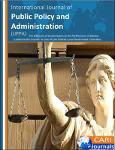The Influence of Social Factors on the Performance of Elected Leaders to the Council: A Case of Lira District Local Government Councilors
Abstract
Purpose: The study assessed the influence of social factors on the performance of local government councilors in Lira District Council. Specifically, the study assessed the influence of selected social factors (gender, age and education attainment) on the performance of local councilors.
Methodology: A case study design was used, and 28 respondents were sampled using both purposive and simple random sampling techniques from which questionnaire were used for data collection. Data were analyzed using IBM SPSS statistics (version 23) to generate descriptive and inferential statistics which are presented in tables, percentages, and frequencies.
Findings: Findings reveal a strong and positive relationship between education attainment and the performance of councilors (r=0.719, p<0.01); and a positive and strong relationship between age and the performance of councilors (r=0.625, p<0.05). However, the study revealed a weak and positive relationship between gender differences and the performance of councilors (r=0.061, p<0.05).
Unique contribution to theory, practice and policy: Given that social factors yielded an Adjusted R2 of 0.13.5, we conclude that education attainment and the age of councilors are significantly correlated to the performance of local councilors. From the study, it is encouraged that a policy aimed to regulate the minimum education requirement be set to a post-primary level now that the Local governments act does not stipulate any educational qualifications for one to become a local councilor. This study is relevant to policy makers, in Uganda as well as those advocating for better local government performance, to formulate policies that aim to address the dynamics of local governance in the country.
Collections
- Research Articles [143]

